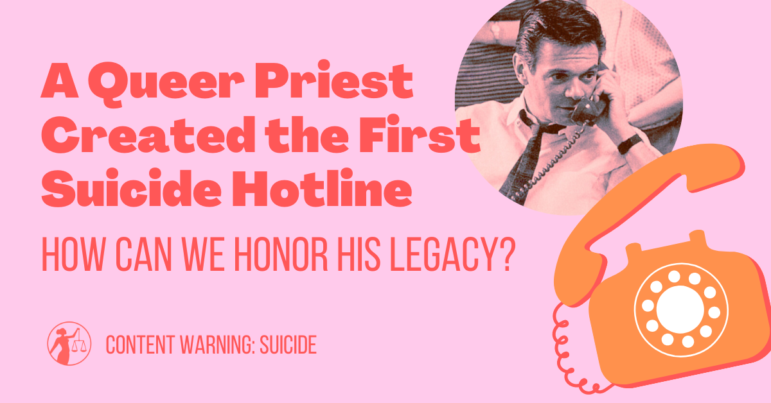Content warning: suicide
It’s been a tumultuous Pride Month. Here in Texas, we’re celebrating LGBTQIA+ lives on the heels of a legislative session that was ferociously cruel to transgender Texans, their families, and the entire LGBTQIA+ community — and legislatures across the country employed the same tactics to attack their own constituents.
On a national scale, backlash over Target Pride sections, beer commercials, and any products sporting rainbows for June have been the center of vitriol in right-wing circles. While this happens every Pride Month, the tone feels especially heartless this year.
The rhetoric is more than cruel — it’s dangerous. We know that the fight to create a more just and equitable world for LGBTQIA+ people is about saving lives.
Bernard Mayes, an LGBTQIA+ Anglican priest and BBC correspondent who created the first suicide hotline in the United States in 1962, knew this too.
Mayes created the hotline after observing record-high suicide rates among young LGBTQIA+ people in San Francisco. While so many had flocked to the city in search of community and acceptance, Mayes saw that a change of address couldn’t fully heal the trauma so many had experienced from living in a country — or escaping from a family — that was widely unaccepting.
Bernard felt that “we had to have some kind of service which would offer unconditional listening, and that I would be this anonymous ear.”
Sixty years later, San Francisco Suicide Prevention is the oldest community-based telephone crisis center in the United States and has undoubtedly inspired countless crisis hotlines since its founding — a resource we still desperately need.
The world is a different place than it was in 1962 — same-sex marriage is legal, “don’t ask, don’t tell” has been repealed — but we’re still building a society where LGBTQIA+ people can feel safe and embraced.
Cut from the same compassionate cloth as Bernard Mayes, our Just Texas community of progressive people of faith and faith leaders from diverse religious traditions who publicly and vocally support LGBTQIA+ equality for all Texans are vital allies in this fight.
This Pride Month and beyond, may we embody the spirit of Bernard Mayes and honor his legacy alongside the hundreds of advocates of faith and non-faith across Texas who will never stop creating a world where all of us feel at home.
Our love is stronger than any hate, and together, we can create change that will endure for generations — just like Mr. Mayes.


